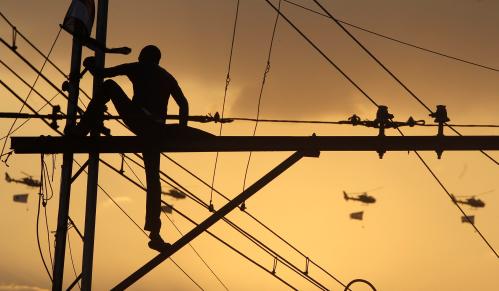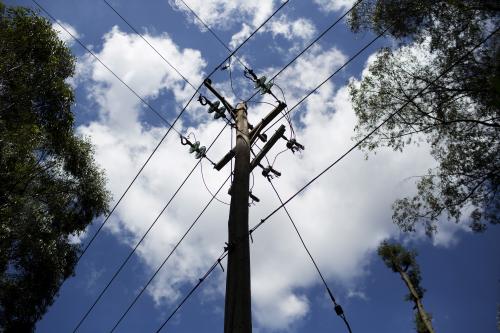In September 2019, the World Bank released a report, “Rethinking Power Sector Reform in the Developing World,” evaluating the successes and challenges of power sector reform in developing countries. The report looks at adoption of the “Washington Consensus” of power sector reform, which emphasized the restructuring of utilities, creation of regulating bodies, participation of the private sector, and establishment of competitive power markets. It finds that reforms were adopted selectively and inconsistently across the developing world, and that implementation of reforms has been a challenge.
Participation of the private sector has particularly been a challenge in sub-Saharan Africa. Figures 1b and 1c show that private investment in Africa’s power sector from 1990-2017 was low compared to other regions of the world, particularly for power distribution and transmission. Furthermore, over 90 percent of private sector investment was from foreign or mixed domestic and foreign sources. The report states that investment from foreign sources can have significant implications for a country’s attitude towards privatization and risk allocation, and can make countries more vulnerable to foreign exchange risks.
Figure 1. Private investment in the power sector by region and source
Source: World Bank, Rethinking Power Sector Reform in the Developing World, 2019; based on World Bank Private Participation in Infrastructure database, 2018.
Even when power contracts have been awarded to the private sector, sub-Saharan African countries have faced challenges with the completion of these contracts. Figure 2 shows that private sector contracts in the power distribution sector have been canceled at a much higher rate in Africa than in the rest of the world. Cancellation rates were highest for divestitures (more than 60 percent) and management contracts (more than 30 percent), and averaged 22 percent of all distribution transactions. Most cancellations were initiated by governments or by the departure of private operators due to dissatisfaction over contractual terms.
Figure 2. Private sector contract cancellations in distribution, by type of contract, 1990-2017
 Note: “IPP” = independent power producer.
Note: “IPP” = independent power producer.
Source: World Bank, Rethinking Power Sector Reform in the Developing World, 2019; based on World Bank Private Participation in Infrastructure database, 2018.
Overall, the report states that the private sector has the potential to be a major contributor to power generation and distribution capacity in Africa, but challenges remain. From the perspective of the private sector, it can be challenging to achieve high financial returns in uncertain operating environments. To improve the probability of high returns and reduce the risk of contract cancellation, the report states that privatization of power distribution should only take place when economic conditions are strong and relatively certain, and few political impediments exist.
The Brookings Institution is committed to quality, independence, and impact.
We are supported by a diverse array of funders. In line with our values and policies, each Brookings publication represents the sole views of its author(s).







Commentary
Figure of the week: Funding Africa’s power sector
January 8, 2020